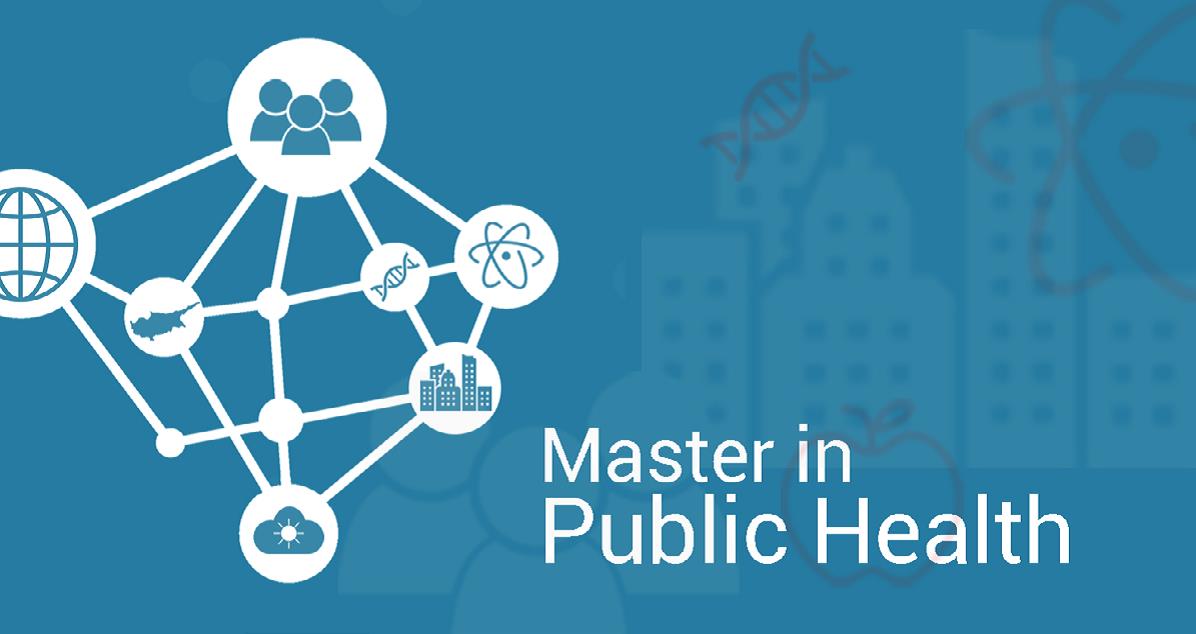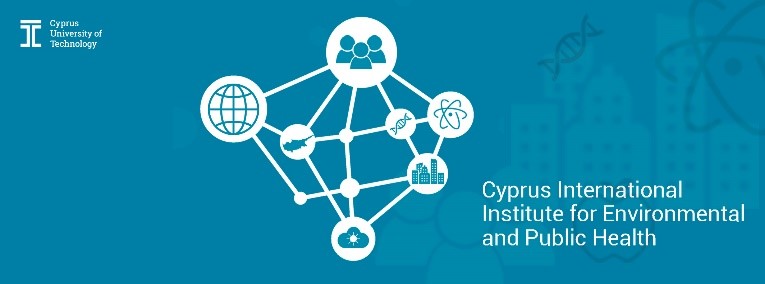Δεν θα υπάρξει εισδοχή νέων φοιτητών/τριών για την ακαδημαϊκή χρονιά 2026-27.
Master in Public Health MPH
Structure
Description
Our interdisciplinary Master’s programme in Public Health (MPH) has been designed for anyone wants to make a difference in the field and develop practical skills for their future. Its primary aim is to train health professionals and new graduates of a wide range of relevant disciplines (e.g. biology, mathematics, medicine, nursing, psychology) in acquiring the technical and soft skills demanded by the public health sector in the 21st century.
The unique structure of the MPH programme allows for the acquisition of core practical skills in key areas of public health science and practice, as well as for specialization in a one of the two offered concentrations (Environmental Health OR Epidemiology & Biostatistics), thereby providing depth and breadth to the postgraduate studies that each of our students would like to pursue.

Download the official MPH brochure here
Another strength of the program is the CII’s long-standing experience (>14 years) in offering high quality Master programs as a result of its historical association with the Harvard T.H. Chan School of Public Health. The program builds on courses that have been offered by the Institute during the last decade (e.g. Biostatistics, Epidemiology and Occupational Health), with additional new courses, such as Health Education & Promotion and Health Economics & Policy, taught by distinguished faculty from the Cyprus University of Technology (CUT) and other leading schools of public health. The programme is taught in English and the class size is small (about fifteen students).
Learning outcomes
By the end of the MPH program, students should have acquired the following:
- A solid understanding of key concepts in identifying risk factors and health indicators for various diseases across different population groups.
- Practical skills in designing studies, collecting and analyzing data for the purpose of investigating important hypotheses in public health.
- Knowledge of different behaviors and social structures within a population and how these affect the overall health of the population.
- Be able to assess the contributions of public health leaders in the administration of health services.
- Be able to analyze risks and develop strategies to improve public health through a healthier environment and lifestyle and a safer workplace with fewer accidents.
Key benefits
- Offers specialized interdisciplinary graduate training in several subject areas, research and implementation methods in public health.
- Organized and primarily taught by the Cyprus International Institute for Environmental and Public Health (CII), a department nationally and internationally recognized as an active center for research and education in the core public health fields of Epidemiology and Environmental Health in Cyprus and the wider Mediterranean region.
- Potential for collaborations within CUT as well as with other universities or relevant organizations during your master’s dissertation.
- Study with students from diverse and rich backgrounds.
- Located in a beautiful modern building at Limassol’s historical city center.
- Our state-of-the-art wet and dry laboratories provide an added resource for those who wish to pursue their thesis project as a part of ongoing research at CII.
Duration of studies
Prospective students can enter the programme in the beginning of each academic year (early September) and may choose one of the following modes of study:
Full Time: Total duration of 14 months, including two (2) academic semesters of taught modules and a master’s dissertation that can be completed in absentia.
Part Time: Typical duration of 26 months, including four (4) academic semesters of taught modules and a master’s dissertation that can be completed in absentia.
Curriculum
The programme consists of 11 modules (including the master’s dissertation) that are required to fulfill the requirements of the award of Master in Public Health (MPH) degree.
Each student must take all 8 core (compulsory) modules plus 2 out of the 4 specialization modules and the master’s thesis module. These correspond to a total of 90 ECTS with 60 ECTS of taught modules (46 ECTS core modules and 16 ECTS specialization modules) over a minimum of two academic semesters (Fall and Spring). The remaining months are fully devoted to the research-based dissertation (thesis) for 30 ECTS.
Full-time (14 months) programme schedule*:
1st Semester – Fall (September-December)
- MPH_601 Basic Epidemiology (8 ECTS) Compulsory
- MPH_602 Basic Biostatistics for Public Health (8 ECTS) Compulsory
- MPH_603 Health Informatics (6 ECTS) Compulsory
- MPH_604 Research Ethics in Public Health (4 ECTS) Compulsory
- MPH_612 Infectious Diseases and Antimicrobial Resistance (4 ECTS) – Compulsory
2nd Semester – Spring (January – May)
- MPH_605 Health Education and Promotion (6 ECTS) – Compulsory
- MPH_606 Health Economics and Policy (6 ECTS) – Compulsory
- MPH_607* Applied Methods for Public Health (8 ECTS) – Specialization
- MPH_608^ Environmental Health Evaluation (6 ECTS) – Specialization
- MPH_609* Advanced Biostatistical Methods (6 ECTS) – Specialization
- MPH_610^ Environment and Population Health (8 ECTS) Specialization
- MPH_611 Global Health (4 ECTS) – Compulsory
* Specialization in Epidemiology and Biostatistics
^ Specialization in Environmental Health
3rd Semester – Fall (June – November)
- MPH_613 Thesis (30 ECTS) Compulsory*
*Part-time students would typically need to split modules offered in the 1st and 2nd semester into four (4) semesters over a period of two academic years.
**The master’s thesis can be submitted once a year at the end of November.
Format
All taught modules are comprised of in-class lectures/seminars/tutorials (each of two to three hours duration), in addition to self-study (e.g. homework).
The master’s dissertation/thesis is supervised by at least one member of the programme’s faculty with relevant expertise to your topic of interest and it may involve field work (i.e. data collection) and/or computer-based data analysis, in addition to self-study (i.e. literature review and writing).
Methods of Assessment
You will be assessed through a combination of coursework and examinations. Depending on the specific module, these could be in the form of problem-solving exercises, essays, reports, oral presentations and/or computer-based practicals.
The curriculum of the MPH program is nationally-, and EU-accredited by the Cyprus Agency of Quality Assurance and Accreditation in Higher Education (DI.P.A.E.) and the European Agency for Public Health Education Accreditation (APHEA), respectively.
Programme Coordinator:
Costas Christophi, PhD (CII Academic Coordinator)
Associate Professor of Epidemiology and Biostatistics
Cyprus International Institute for Environmental and Public Health (CII)
Faculty of Health Sciences
Contact: costas.christophi@cut.ac.cy
Enrollment
Entry requirements
Applicants should hold a bachelor’s degree or its international equivalent and have a background in health sciences, biological sciences, social sciences, mathematics or another relevant a discipline.
Applicants must have an accredited Bachelor’s degree, awarded by an accredited institution in the country where it operates, or an equivalent to Bachelor’s degree as judged by the Cyprus Council for the Recognition of Higher Education Qualifications (KYSATS). Undergraduate students that are about to graduate can apply for a master’s programme, considering that they expect to receive their Bachelor’s degree before commencement of the master’s programme.
English is the primary working language at the Cyprus International Institute for Environmental and Public Health (CII). Accordingly, the Master’s programme in Public Health (MPH) is taught and assessed in English. Candidates would therefore need to provide a proof of English proficiency (see below for more details).
Application Procedure
Applications should be submitted electronically using the University’s online application portal from the beginning of February onwards:
The following documents are required to be submitted with an application:
- A copy of a valid passport or Civil ID.
- A Curriculum Vitae (C.V.)
- Copies of official University degrees or a confirmation letter which states that the candidate is expected to graduate before he/she starts the postgraduate programme.
- Copies of official Academic Transcripts.
- A brief Personal Statement of goals and research interests (approximately 500 words) in which the candidate explains why he/she wishes to pursue a graduate programme at CII.
- Proof of English proficiency*: clearly stated in the degree certificate or transcript or in a confirmation letter from your university), OR G.C.E O-Level / I.G.C.S.E exams with a grade of at least C, OR ELTS/ IELTS with grade of at least 6.5, OR ΤOEFL with grade of at least 580 (paper-based test)/82 (internet-based test).
- Reference letters from at least two (2) referees who are in position to evaluate your academic and/or professional activities. At least one of your referees should be familiar with your academic work (e.g. your current/former BSc thesis supervisor or academic advisor/tutor/lecturer etc.). References should be submitted electronically by the referees themselves, using the online reference form that can found in the following link: https://redcap.link/referenceform2023
- OPTIONAL: Any other certificates and documents, such as samples of relevant academic or professional work (publications, articles, etc.).
*If you plan to take an English language test after the time of your application, you may submit a proof of English proficiency before classes start. Alternatively, you could take the English Entry Test at the Language Centre of the Cyprus University of Technology on a pass-fail basis.
Note: An application will not be considered complete, and no final admissions decision will be made, until ALL the required documents have been submitted.
Click here to download the complete MPH application guide with detailed information on the required documents and how to submit your application.
The initial deadline of applications is 16 May 2023. However, late applications will be assessed depending on availability of places in the programme.
Application Evaluation
The evaluation process is completed by the CII Admissions Committee between 7-10 working days, if the applicant submits all the required documents. Final admissions decisions are made by the Director of Service for Academic Affairs and Student Welfare and communicated to applicants via email.
Tuition
The tuition fee for the programme is €4,100 for both EU and Non-EU citizens. For further information on tuition and other fees, please visit the following link: https://www.cut.ac.cy/students/practical-information/tuition-and-fees/?languageId=1.
Scholarships
Partial tuition-fee scholarships may be offered to a limited number of the most highly qualified candidates, who will submit their complete application by the submision deadline of applications. These are awarded primarily on the basis of academic merit, with some consideration of financial need.
Strengths
Strengths
The teaching and research structure and rules of the new MPH program have been built on those of the Cyprus International Institute for Environmental and Public Health (Cll), as previously established through its historical association with the Harvard School of Public Health (HSPH). The Institute has more recently been invited to address the educational and research gap in public health in Cyprus and the wider Eastern Mediterranean region. CII is the only academic entity in Cyprus that is actively involved in research on the impact of the environment on population Health, and since 2009, the Institute is part of the School of Health Sciences at the Cyprus University of Technology (CUT), which offers an environment of stability and perspective.
The current faculty members form a dynamic and energetic team of young scientists with a wide a range of research interests, including environmental and lifestyle risk factors of obesity and diabetes, epidemiology of cardiovascular and respiratory diseases, the human exposome, and the use of systematic reviews and meta-analysis in relevant areas of public health research.

The existing Infrastructure of the Institute with dry and wet laboratories (accompanied by a small biobank) provides a useful resource for the training of MPH students. For example, advanced technology of atmospheric pollution measuring station is created and installed in the Institute’s building.
The use of English as the language of instruction allows admission to students not only from Cyprus but also from many other countries in the region and around the world. More than 130 students from Cyprus, Middle East, North Africa, Europe and America have already graduated from Cll. The quality of our educational programs is reflected by the career destinations of CII graduates. Several of them have been awarded full fellowships for doctoral programs at some of the best universities in the world, including Harvard, Yale and Oxford. Other graduates have taken key relevant jobs in Cyprus and abroad.
The Institute is a proud member of the Association of Schools of Public Health in the Europe Region (ASPHER) and the MPH programme.
For further information about the Institute, please visit its official website: https://www.cut.ac.cy/faculties/hsc/cii/?languageId=1.
Quotes from CII Student Alumni
“I encourage everyone who’s interested in Environmental and Public Health, Epidemiology, Biostatistics and Environmental Policy to apply. CII is a true ‘hidden gem’! ”
Rodos Rodosthenous, MSc Environmental Health (2009-2010)
“I highly recommend CII and its Programs to prospective students. Good luck guys and enjoy this unique opportunity!”
Michele Padovan, MSc Environmental Health (2011- 2012)
“I would highly recommend CII and its programs to anyone interested in graduate level studies in public health! “
Katerina Stylianou, MSc Epidemiology and Biostatistics (2012 -2013)
“The experience that I gained in CII is always in my mind condensed in the phrase "work hard, play hard and you will never lose".
Lia Markogiannaki, MSc Environmental Health (2012-2013)
For full CII student testimonials, visit https://www.cut.ac.cy/faculties/hsc/cii/alumni/
Employment opportunities
Potential career paths
The Master program in Public Health will provide knowledge and expertise to a wide range of new graduates and professionals in order to make a difference in their communities and beyond by succeeding in advancing the overall health of populations locally as well as globally.
An MPH degree could open doors far beyond the commonly assumed government career path. It can also serve as a tool to boost an already established career in the health sciences or the healthcare sector. There is a variety of settings in which public health graduates may work:
- Health department administration, disaster preparedness and public nursing are just three areas in which a public health graduate may work for the government.
- Whether as a consultant or employee, public health graduates often work for pharmaceutical brands, healthcare organizations or insurance companies.
- Non-profit roles for public health graduates tend to address gaps in healthcare or specialize in specific populations. For example, a non-profit role may serve minorities or single mothers.
- Education-related roles often serve as teachers to students in health-related courses at different levels (from primary school to university level).
- The programme may also serve as a preparation for further postgraduate studies in a public health-related field at the doctoral (PhD) level and ultimately for an academic career.
Examples
Our MPH graduates will be able to compete for new positions either in the public or private sector in Cyprus and abroad. Some examples of key positions held by CII-CUT graduates so far are:
- Senior Officer, Department of Environment (Cyprus)
- Public Health Physician/ Biostatistician, University of Benin(Nigeria)
- ClinBay - Statistical CRO(Cyprus)
- Scientist, U.S. Centers for Disease Control and Prevention(USA)
- Consultant – Environmental and other Consulting(Cyprus)
- Research Assistant, World Health Organization(Switzerland)
- Faculty member at University of Southern California (USA)
- Senior Advisor in Public Health to the Prime Minister (FYROM)
- Postdoctoral fellow, Harvard Medical School (USA)
- Senior Officer, Cancer Registry Unit, Ministry of Health (Cyprus)
- Scientific Editor in BMC Public Health (UK)
- Postdoctoral Fellows at University of California, Berkeley (USA), Oxford University (UK), Harvard University (USA), Imperial College, London (UK)
- Researcher, The Cyprus Institute (Cyprus)
- Staff Scientist, Dasman Diabetes Institute (Kuwait)
- Consultant, Gradient Corporation, Cambridge, MA(USA)
- Pharmaceutical industry (Cyprus)

